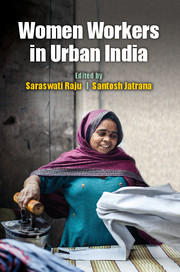Book contents
- Frontmatter
- Contents
- List of Figures
- List of Tables
- Preface
- 1 Setting the Backdrop
- 2 Women Workers in Urban India and the Cities
- 3 Gendered Vulnerabilities: Work-Life Trajectories of Female Domestic Workers in Jaipur
- 4 Occupational Domestication in a Post-Resettlement Context: An Analysis of Women's Work in Kannagi Nagar, Chennai
- 5 Old Jobs in New Forms: Women's Experiences in the Housekeeping Sector in Pune
- 6 Persistent Inequalities and Deepened Burden of Work? An Analysis of Women's Employment in Delhi
- 7 Spare Change for Spare Time? Homeworking Women in Banaras
- 8 Gender, Work and Space: Home-based Workers in Garment Industry in Kolkata
- 9 Labour Control and Responses: Women Workers in an Apparel Park in Kerala
- 10 New Urban Economic Spaces and the Gendered World of Work in Kolkata
- 11 Gender Equality and Women's Employment in the Banking Sector in India
- 12 Women Body Screeners and the Securitization of Space in Indian Cities
- Notes on Contributors
- Index
10 - New Urban Economic Spaces and the Gendered World of Work in Kolkata
Published online by Cambridge University Press: 05 May 2016
- Frontmatter
- Contents
- List of Figures
- List of Tables
- Preface
- 1 Setting the Backdrop
- 2 Women Workers in Urban India and the Cities
- 3 Gendered Vulnerabilities: Work-Life Trajectories of Female Domestic Workers in Jaipur
- 4 Occupational Domestication in a Post-Resettlement Context: An Analysis of Women's Work in Kannagi Nagar, Chennai
- 5 Old Jobs in New Forms: Women's Experiences in the Housekeeping Sector in Pune
- 6 Persistent Inequalities and Deepened Burden of Work? An Analysis of Women's Employment in Delhi
- 7 Spare Change for Spare Time? Homeworking Women in Banaras
- 8 Gender, Work and Space: Home-based Workers in Garment Industry in Kolkata
- 9 Labour Control and Responses: Women Workers in an Apparel Park in Kerala
- 10 New Urban Economic Spaces and the Gendered World of Work in Kolkata
- 11 Gender Equality and Women's Employment in the Banking Sector in India
- 12 Women Body Screeners and the Securitization of Space in Indian Cities
- Notes on Contributors
- Index
Summary
Introduction
Scholars have suggested that industrial technology, being associated with bodily prowess, typically has had a masculine connotation. However, with the emergence of the new knowledge economy in the contemporary era, the conceptualization of technology seems to have undergone a change from an essentially masculine perspective to a feminine one. It now refers to collection, processing and dissemination of intellectual knowledge and information. It has been set free from manual labour that constitutes the essentially masculine component and brought within the ambit of women. Industrial technology may have had a patriarchal character, but digital technologies, based on brain rather than brawn, on networks rather than hierarchy, herald a new relationship between women and machines (Wajcman 2010).
In contemporary times, women have been projected as the privileged users and beneficiaries of technologies in the private as well as in the public spaces. In the latter sphere, the rise of the information and communication technology (ICT) based jobs in the wake of economic liberalization and the subsequent entry of women in this sector is a case in point. The main contention in this chapter is to understand how employment in these jobs have been affecting women's negotiations and resistances in the labour market given the fact that digital technologies have been posited as offering possibilities for destabilizing gender differences (Green and Adam, 1999; Kemp and Squires, 1998; Kirkup et al. 2000, also see Wajcman 2010). Scholars (such as Plant 1998, cited in Wajcman 2010, 148) argue that such technologies blur the boundaries between male and female, revalorise the feminine, providing the technological basis for a new form of society that is potentially liberating for women. In fact, professional women in the corporate sectors frequently feature the magazine covers, public hoardings, company campaigns etc. and ‘usually stand in for broad societal change in a country conventionally thought of as particularly patriarchal’ (Radhakrishnan 2009, 197). Thus, these professional women working in the new generation sectors are placed at the ‘economic and cultural cutting edge of a rapidly changing urban India’ (Ibid: 196).
That said, it is salutary to be reminded that “the possibility and the fluidity of gender discourse in the virtual world is constrained by the visceral, lived gender relations of the material world” (Wajcman 2010). It is these existential gender relations that affect the doing of gender even in the new economic spaces.
- Type
- Chapter
- Information
- Women Workers in Urban India , pp. 256 - 290Publisher: Cambridge University PressPrint publication year: 2016
- 1
- Cited by



